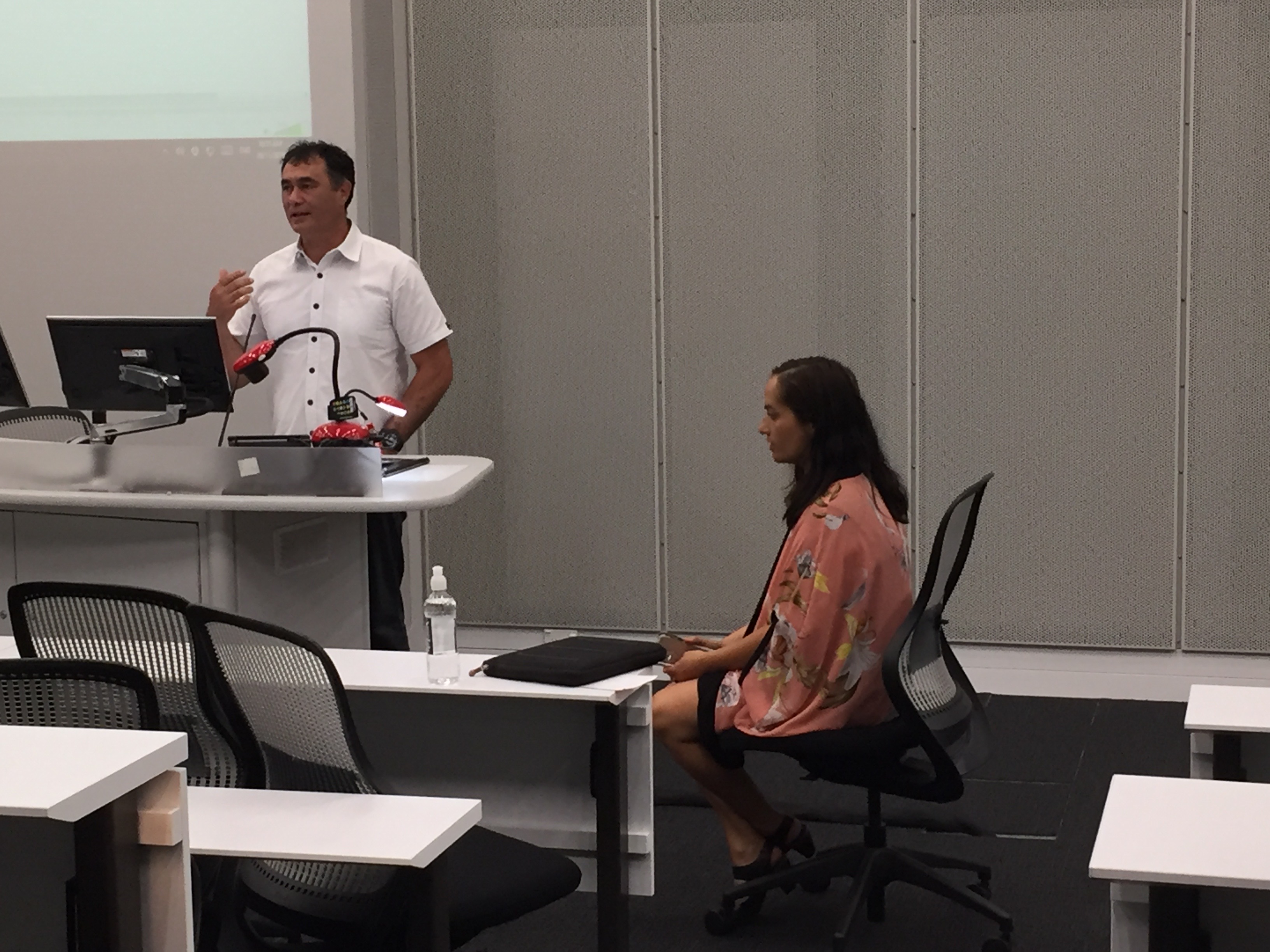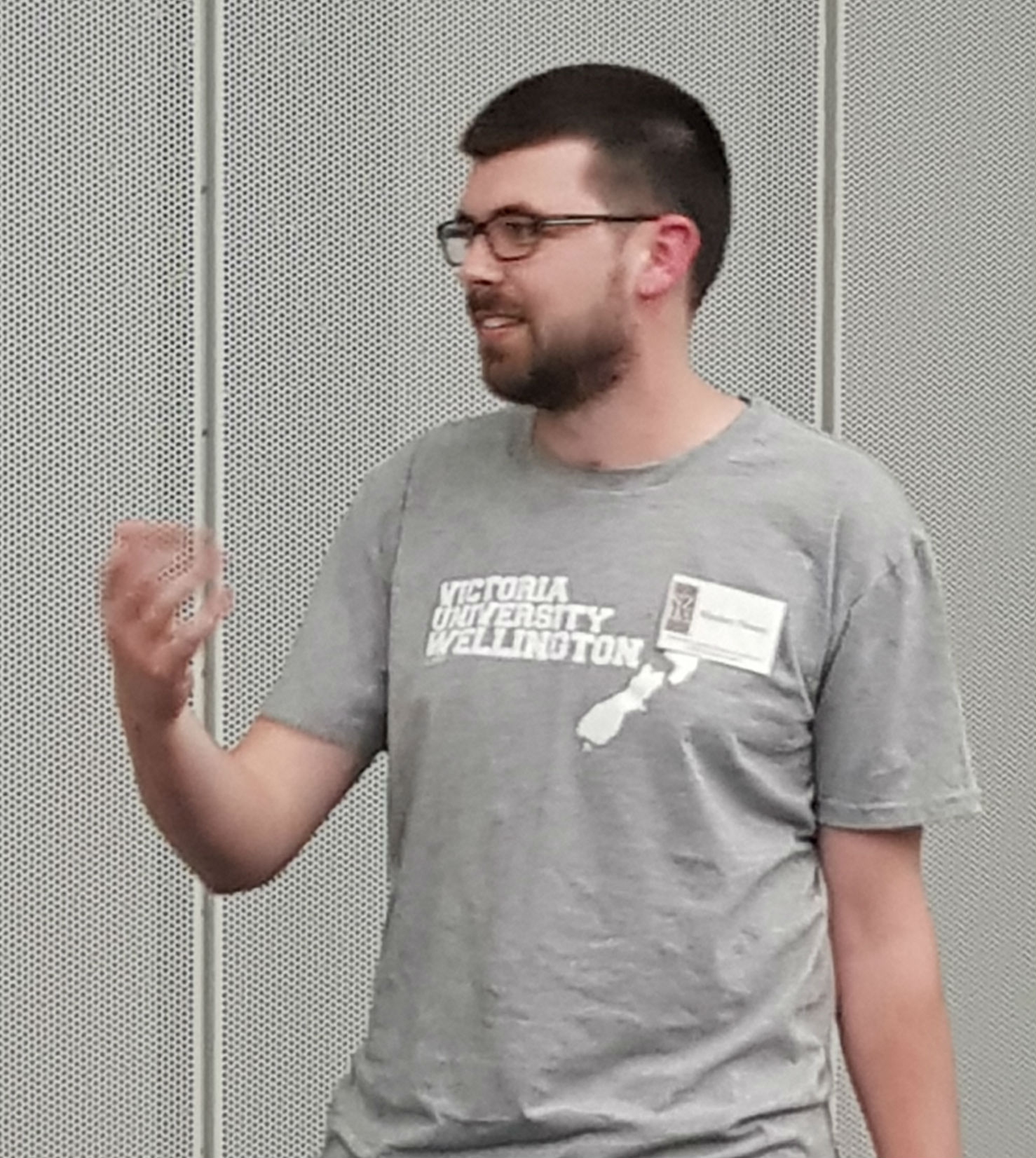NZHA conference: Encountering history
The History programme hosted the New Zealand Historical Association’s (NZHA) biennial conference, Kanohi ki te kanohi: Histories for our Time, from 28–30 November 2019.
Over 200 historians from around New Zealand and overseas attended—something of a record. There were four keynote speakers, over 120 papers and panels, and the conference was preceded by a postgraduate day on 27 November, with over 50 participants. We also welcomed our colleagues from the New Zealand Archaeological Association who delivered two full sessions during the conference. Presenters responded in varied and creative ways to the theme of the conference: Meetings, encounters, exchanges, kisses, words, conversations, attractions, glares, confrontations, curiosities: how have people come face to face? What histories are made in these moments? What happens when historians face their subjects? As Dr Wayne Ngata has stated: ‘Kanohi ki te kanohi’ or ‘face-to-face’ communication is a facet of human behaviour. It allows one to not only see who or what one is communicating with, but also to hear, feel, and smell the relationship.
The conference began with a pōwhiri at Te Herenga Waka marae and was where the first keynote speaker, Associate Professor Alice Te Punga Somerville (University of Waikato), delivered the Wiremu Maihi Te Rangikāheke Lecture, entitled ‘Out of Order: Histories, Structures, Sovereignty.’ In her address, Dr Te Punga Somerville challenged some dominant ideas about the ordering of historical narrative and, as she explains, considered ‘the kinds of disordered and disorderly histories that become visible when sitting in a specific place,’ in this case, Matiu/Somes Island. She began in the centre of the Whanganui-a-Tara harbour and traced the flow of historical connections out to Te Moana-nui-a-kiwa.
The J. C. Beaglehole Lecture, by Professor Jim McAloon, was entitled ‘“Raw material drawn from the remotest zones”: Aotearoa/New Zealand and Capitalism’s Pacific Frontier,1770s–1830s’, and suggested that framing the histories of Aotearoa and Te Wai Pounamu from the 1770s to the 1830s around the revolutionary and globalising nature of capitalism might usefully complement other approaches.
Associate Professor Susan Hill (University of Toronto) gave the Friday keynote lecture. Dr Hill, director of her university’s Centre for Indigenous Studies, is a Haudenosaunee citizen of the Wolf Clan, Mohawk Nation and resident of Oshwe:ken, Grand River Territory. She spoke on the complexities of apologies, exonerations, and reconciliation between settler states and Indigenous peoples, with particular reference to the late Nehiyawak Chief Poundmake (convicted of treason in 1885) and the late Haudenosaunee/Cayuga Chief Deskaheh (exiled after 1919). The parallels with colonialism in Aotearoa were striking.
Associate Professor Kate Hill of the University of Lincoln (in England) delivered the final keynote, ‘Intimate encounters with the past in the museum, c.1880–1950: Dressing up, lifestyle, and identity.’ She explored how and why museums and curators moved away from staging ‘objective’ exhibits as sites of education and engaged ‘visitors’ imagination, emotion and memory,’ through activities such as dressing up.
A highlight of the conference was the screening of the short film, ‘E Whiti E Te Raa: Shine,’ by Dr Arini Loader (Ngāti Raukawa) and Dr Mike Ross (Ngāti Hauā). The film centres on a Ngāti Hauā waiata ‘Let the sun shine,’ one of 230 written down by prisoners captured and imprisoned after the 1863 battle of Rangiriri. It is both heartbreaking and hopeful.
The social function on the Friday evening included a number of awards. The Erik Olssen Prize for the best first book went to Dr Jane McCabe (University of Otago), for Race, Tea and Colonial Resettlement. The W. H. Oliver Prize for the best book on a topic in New Zealand history was awarded to Dr Jonathan West (Stout Research Centre) for The Face of Nature: An Environmental History of the Otago Peninsula. The Mary Boyd Prize for the best historical article went to Professor Charlotte Macdonald (History) for ‘Woolwich to Wellington: From Settler Colony to Garrisoned Sovereignty.’ The Award for Best Postgraduate Paper was given to Philippa Wyatt (Massey) for ‘Keith Sinclair and the History of humanitarianism.’ The Fédération des Alliances Françaises de Nouvelle-Zélande awarded the John Dunmore Medal for excellence in scholarship relating to France to Dr Adrian Muckle (History).
From beginning to end the conference was characterised by critical thinking about the practice of history. At the postgraduate day on Wednesday, Professor Emerita Bettina Bradbury and Alice Freeman Palmer Professor of History Mrinalini Sinha (University of Michigan) spoke about ‘the stakes’ involved in studying History—why people do it, how questions are asked of the, past, what the meaning of those questions might be. In the final keynote, Associate Professor Kate Hill put up the question: ‘What do historians have to do with it?’—the 'it' being the responsibility of curators/museums/public places where people in the present encounter the past. This question was addressed with further questions: What standards of accounting and recounting do we hold ourselves—and each other—to? How do we train our students to account and recount? What is our responsibility to the future? And the future of New Zealand history in schools was certainly a hot topic at the conference. Head of New Zealand and Pacific Cultures at the Museum of New Zealand Te Papa Tongarewa Dr Bronwyn Labrum reflected: ‘It was the best NZHA I’ve been to for a while and the energy and urgency around matters historical was palpable and visceral.’
The conference organisers are deeply grateful to those who enabled Te Herenga Waka marae to be a conference session space right through the conference, and to Te Herenga Waka—Victoria University of Wellington and the Canadian High Commission for their support.
 The NZHA conference organising committee wish to acknowledge the incredible work of our postgraduate students here in History, who, led by the very capable Hayden Thorne, worked through the conference to ensure everyone was well looked after. As outgoing NZHA secretary Dr Cybèle Locke (History) says: ‘The future of history is in very good hands.’
The NZHA conference organising committee wish to acknowledge the incredible work of our postgraduate students here in History, who, led by the very capable Hayden Thorne, worked through the conference to ensure everyone was well looked after. As outgoing NZHA secretary Dr Cybèle Locke (History) says: ‘The future of history is in very good hands.’
